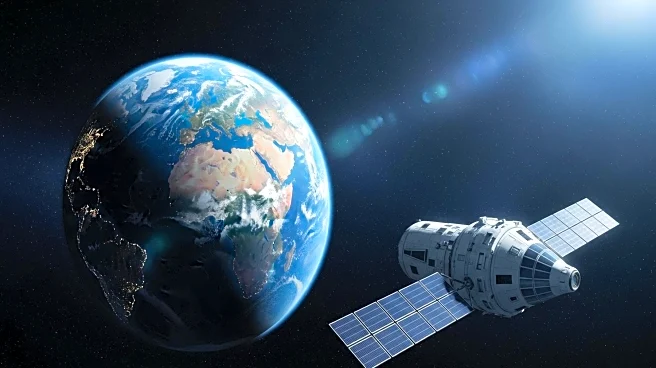What is the story about?
What's Happening?
China's Tianwen 2 spacecraft has captured a selfie with Earth, showcasing its capabilities in space exploration. Released by the China National Space Administration on October 1, 2025, the image was taken using a monitoring camera on the spacecraft's robotic arm. The photo features the Chinese flag and shows Earth shining in the distance, approximately 26.5 million miles away. Tianwen 2 is en route to the asteroid Kamo'oalewa, one of Earth's seven known quasi moons, and is expected to reach its destination by July 2026. The spacecraft is currently functioning normally and has completed several in-orbit tests, including the deployment of sampling devices.
Why It's Important?
The Tianwen 2 mission underscores China's growing capabilities in space exploration, positioning the country as a significant player in the global space race. The mission aims to collect samples from the asteroid Kamo'oalewa and return them to Earth by late 2027, which could provide valuable scientific insights into the origins of the asteroid and its potential connection to the moon. This development highlights China's independent approach to space exploration, as U.S. agencies are restricted from bilateral work with China under the Wolf Amendment. The mission also reflects broader geopolitical dynamics, with Congressional hearings in the U.S. expressing security concerns about Chinese activities in space.
What's Next?
Following the sample collection from Kamo'oalewa, Tianwen 2 will return the samples to Earth using a reentry capsule. The spacecraft will then continue its journey to visit the main belt comet 311P/PANSTARRS, expected around 2035. This extended mission demonstrates China's long-term commitment to space exploration and its ambition to conduct deep-space rendezvous. The success of Tianwen 2 could further solidify China's status as a space powerhouse and influence future international collaborations and competitions in space exploration.
Beyond the Headlines
China's space endeavors, including the Tianwen 2 mission, may have broader implications for international space policy and cooperation. As China continues to advance its space technology, it could challenge existing space exploration norms and encourage other nations to reassess their strategies. The mission also raises ethical and legal questions about space exploration, such as the ownership and use of extraterrestrial resources, which could become more prominent as more countries engage in asteroid mining and other space activities.















